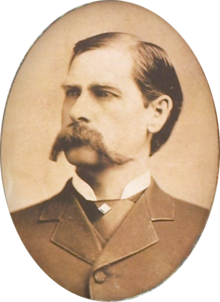Wyatt Earp
Page 1 of 1
 Wyatt Earp
Wyatt Earp

Wyatt Berry Stapp Earp (March 19, 1848 – January 13, 1929) was an American Old West gambler, a deputy sheriff in Pima County, and deputy town marshal in Tombstone, Arizona Territory, who took part in the Gunfight at the O.K. Corral, during which lawmen killed three outlaw cowboys. He is often mistakenly regarded as the central figure in the shootout in Tombstone, although his brother Virgil was Tombstone city marshal and deputy U.S. marshal that day, and had far more experience as a sheriff, constable, marshal, and soldier in combat. Earp lived a restless life. He was at different times a constable, city policeman, county sheriff, deputy U.S. marshal, teamster, buffalo hunter, bouncer, saloon-keeper, gambler, brothel keeper, miner, and boxing referee. Earp spent his early life in Iowa. In 1870, he married his first wife, Urilla Sutherland Earp, who contracted typhoid fever and died shortly before their first child was to be born. During the next two years, Earp was arrested for stealing a horse, escaped from jail, sued twice, and was arrested and fined three times during the course of 1872 for "keeping and being found in a house of ill-fame". His third arrest was subject of a lengthy account in the Daily Transcript, which referred to him as an "old offender" and nicknamed him the "Peoria Bummer".[2] By 1874, he had arrived in the cattle boomtown of Wichita, Kansas, where his brother had opened a brothel. On April 21, 1875, he was appointed to the Wichita police force and developed a solid reputation as a lawman. In April 1876, he was dismissed from the Wichita police after he was fined $30 for an altercation with a political opponent of his boss.[3] In 1876, he followed his brother James to Dodge City, Kansas, where he became an assistant city marshal. In winter 1878, he went to Texas to track down an outlaw and met John "Doc" Holliday, whom Earp later credited with saving his life. Earp moved constantly throughout his life from one boomtown to another. He left Dodge City in 1879 and moved to Tombstone with his brothers James and Virgil, where a silver boom was underway. There, the Earps clashed with a loose federation of outlaws known as the Cowboys. Wyatt, Virgil, and their younger brother Morgan held various law-enforcement positions that put them in conflict with Tom and Frank McLaury, and Ike and Billy Clanton, who threatened on several occasions to kill the Earps. The conflict escalated over the next year, culminating on October 26, 1881, in the gunfight at the O.K. Corral, in which the Earps and Holliday killed three of the Cowboys. In the next five months, Virgil was ambushed and maimed, and Morgan was assassinated. Pursuing a vendetta, Wyatt, his brother Warren, Holliday, and others formed a federal posse that killed three of the Cowboys whom they thought responsible. Wyatt was never wounded in any of the gunfights in which he took part, unlike his brothers Virgil and James, or his friend, Doc Holliday, which only added to his mystique after his death. Earp was a lifelong gambler and was always looking for a quick way to make money. After leaving Tombstone, Earp went to San Francisco, where he reunited with Josephine Earp. She became his common-law wife. They joined a gold rush to Eagle City, Idaho, where they owned mining interests and a saloon. They left there to race horses and open a saloon during a real estate boom in San Diego, California. Back in San Francisco, Wyatt raced horses again, but his reputation suffered irreparably when he refereed the Fitzsimmons-Sharkey boxing match and called a foul that led many to believe that he fixed the fight. They moved briefly to Yuma, Arizona, before joining the Nome Gold Rush in 1899. In partnership with Charlie Hoxie, they opened a two-story saloon called the Dexter[4] and made an estimated $80,000[5] (about $2 million in 2017 dollars). Returning to the lower 48, they opened another saloon in Tonopah, Nevada, the site of a new gold find. Around 1911, Earp began working several mining claims in Vidal, California, retiring in the hot summers with Josephine to Los Angeles. Earp made friends among early Western actors in Hollywood and tried to get his story told. He was portrayed in film only once before he died, and very briefly, in the 1923 film Wild Bill Hickok. Earp died on January 13, 1929.[6] He was known as a Western lawman, gunfighter, and boxing referee. He had a notorious reputation for both his handling of the Fitzsimmons-Sharkey fight and his role in the O.K. Corral gunfight. This only began to change after his death when an extremely flattering biography was published in 1931. It became a bestseller and created his reputation as a fearless lawman. Since then, Earp has been the subject of and model for numerous films, television shows, biographies, and works of fiction that have increased his notoriety. Long after his death, he has many devoted detractors and admirers. Earp's modern-day reputation is that of the Old West's "toughest and deadliest gunman of his day." wrote:
https://en.wikipedia.org/wiki/Wyatt_Earp
Page 1 of 1
Permissions in this forum:
You cannot reply to topics in this forum